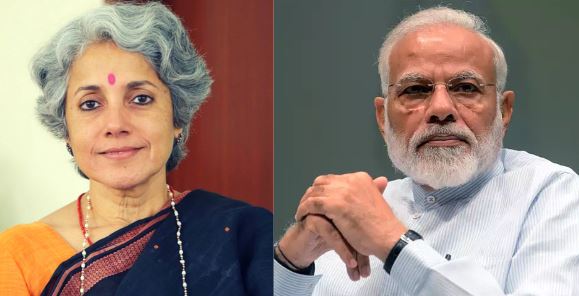India has managed to contain the COVID-19 Pandemic, and despite its high population density, India has far fewer cases than the worst hit parts of the world- the European Continent and the United States.
Now, India’s efforts are winning plaudits all across the world and even the World Health Organisation (WHO) Chief Scientist Soumya Swaminathan has heaped praise on the country’s COVID-19 response, while stressing that India will play an indispensable role in the development of a COVID-19 vaccine.
Swaminathan said that the world should remain prepared for the ongoing transmission to continue for “many many months and for perhaps years to come.”
Speaking on the National Technology Day- anniversary of the successful Pokhran nuclear bomb tests on May 11, 1998, Swaminathan said, “I would like to commend and congratulate the minister (Union Health Minister Harsh Vardhan) and colleagues for having contained so far the COVID pandemic in India and having kept both the number of cases and the number of deaths very low compared to other countries.”
Swaminathan, a former Indian Council of Medical Research (ICMR) Director General, also spoke of how there are several vaccine candidates being currently developed in India, some are working independently and some of them are working in partnerships.
She added, “India will play an important role in vaccine development. The world cannot have enough vaccines for everyone if India is not part of the process.”
With COVID-19 showing no signs of fading out as yet, development of a potent vaccine is being seen as crucial in the fight against the novel Wuhan virus.
The WHO Chief Scientist said, “The aim is to get a (coronavirus) vaccine out in a year or so. Or even less if possible,” while stressing upon the need for global cooperation and knowledge sharing in the development of the vaccine.
It is clear that the WHO Chief Scientist understands the early gains India has made in the battle against COVID-19.
The basic mechanism of a vaccine is to introduce biological products in the body to act against the toxins that are released by an infection. They train the human immunity system to tackle fatal/ harmful viruses, and use biological memory for battling pathogens.
At times even live pathogens, in small quantities, are also administered as vaccines. The weakened viruses cause no real harm but bolster human immunity so that the body can identify and combat the infection. This is why isolating the virus strain is considered the first step towards vaccine development, apart from development of drugs and rapid diagnostic kits.
India gained an early lead in March, when the Indian Council of Medical Research-National Institute of Virology (ICMR-NIV) in Pune succeeded in isolating the strains of Sars-Cov-2, the pathogen that causes COVID-19.
The strain was a 99.99% match with the novel Wuhan virus and Priya Abraham, Director, NIV Pune had stated that it was a model for drug testing and vaccine development. India has been keeping the viruses artificially alive and growing them in cell lines.
Ever since the strain was isolated by NIV Pune, several breakthroughs have been made in the right direction, and only recently the Institute managed to successfully develop the first indigenous anti-SARS-CoV-2 human IgG ELISA test kit, as a part of its efforts to develop a Coronavirus vaccine.
The ICMR has tied up with Bharat Biotech International Limited (MMIL) to develop an indigenous Coronavirus vaccine using the strain isolated by NIV, Pune.
Also helping India is the Bacillus Calmette-Guerin (BCG) vaccine, which is administered to millions of Indian kids after their birth as a part of the country’s Universal Immunisation Programme in the fight against tuberculosis.
The vaccine also has beneficial, off-target effects, and several recent studies have drawn a strong correlation between countries with a mass/ universal BCG vaccination programme and the intensity of Coronavirus. Deaths are higher in countries that do not have a Universal BCG vaccination programme.
Universal BCG vaccination could explain lower cases and deaths in India, and if that is the case India’s campaign against tuberculosis could have accidentally bolstered its fight against COVID-19.
The Pune-based Serum Institute of India, world’s largest vaccine manufacturer, has tied up with the Berlin-based Max Planck Institute for Infection Biology and Vaccine Projekt Management (VPM) company. The two will conduct clinical tests to ascertain whether the tuberculosis vaccine VPM1002 can also effectively serve as vaccination against Coronavirus.
India has therefore taken a significant lead in terms of opening up avenues for developing a vaccine against Coronavirus, which is also being acknowledged by the WHO.
Swaminathan has also spoken about the need to step up manufacturing and scaling up procurement, apart from finding a vaccine against the novel Wuhan virus.
Here also, India will have a critical role to play given that the country has a vibrant pharma industry, and by supplying the anti-Malaria Hydroxychloroquine (HCQ) drug being touted as a game-changer against Coronavirus to the entire world, India has shown how it can produce pharmaceutical products at a war-footing.
As and when a vaccine is found, India’s massive pharma industry will be critical in shoring up production levels and ensuring that the massive demand for the vaccine across the world us met.

























